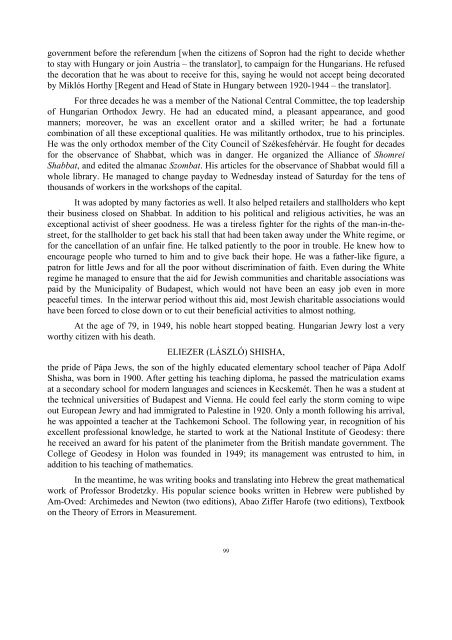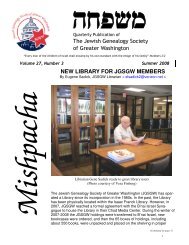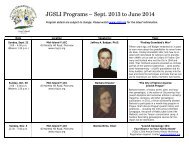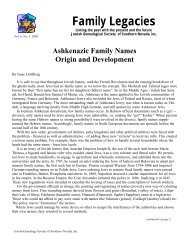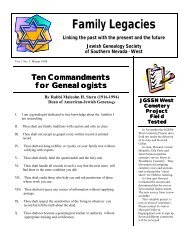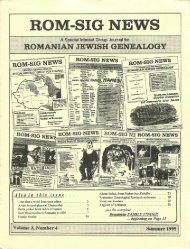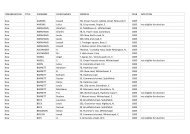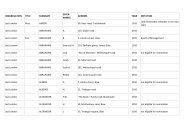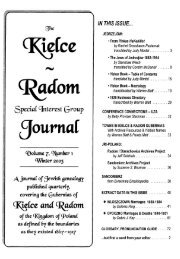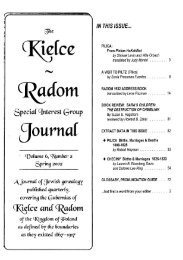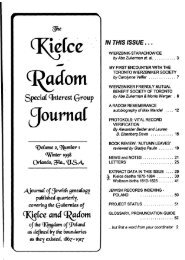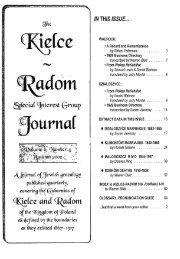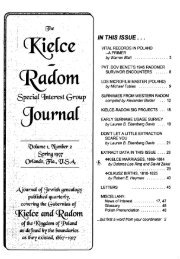THE MEMORIAL BOOK OF PÁPA JEWRY - JewishGen
THE MEMORIAL BOOK OF PÁPA JEWRY - JewishGen
THE MEMORIAL BOOK OF PÁPA JEWRY - JewishGen
Create successful ePaper yourself
Turn your PDF publications into a flip-book with our unique Google optimized e-Paper software.
government before the referendum [when the citizens of Sopron had the right to decide whether<br />
to stay with Hungary or join Austria – the translator], to campaign for the Hungarians. He refused<br />
the decoration that he was about to receive for this, saying he would not accept being decorated<br />
by Miklós Horthy [Regent and Head of State in Hungary between 1920-1944 – the translator].<br />
For three decades he was a member of the National Central Committee, the top leadership<br />
of Hungarian Orthodox Jewry. He had an educated mind, a pleasant appearance, and good<br />
manners; moreover, he was an excellent orator and a skilled writer; he had a fortunate<br />
combination of all these exceptional qualities. He was militantly orthodox, true to his principles.<br />
He was the only orthodox member of the City Council of Székesfehérvár. He fought for decades<br />
for the observance of Shabbat, which was in danger. He organized the Alliance of Shomrei<br />
Shabbat, and edited the almanac Szombat. His articles for the observance of Shabbat would fill a<br />
whole library. He managed to change payday to Wednesday instead of Saturday for the tens of<br />
thousands of workers in the workshops of the capital.<br />
It was adopted by many factories as well. It also helped retailers and stallholders who kept<br />
their business closed on Shabbat. In addition to his political and religious activities, he was an<br />
exceptional activist of sheer goodness. He was a tireless fighter for the rights of the man-in-thestreet,<br />
for the stallholder to get back his stall that had been taken away under the White regime, or<br />
for the cancellation of an unfair fine. He talked patiently to the poor in trouble. He knew how to<br />
encourage people who turned to him and to give back their hope. He was a father-like figure, a<br />
patron for little Jews and for all the poor without discrimination of faith. Even during the White<br />
regime he managed to ensure that the aid for Jewish communities and charitable associations was<br />
paid by the Municipality of Budapest, which would not have been an easy job even in more<br />
peaceful times. In the interwar period without this aid, most Jewish charitable associations would<br />
have been forced to close down or to cut their beneficial activities to almost nothing.<br />
At the age of 79, in 1949, his noble heart stopped beating. Hungarian Jewry lost a very<br />
worthy citizen with his death.<br />
ELIEZER (LÁSZLÓ) SHISHA,<br />
the pride of Pápa Jews, the son of the highly educated elementary school teacher of Pápa Adolf<br />
Shisha, was born in 1900. After getting his teaching diploma, he passed the matriculation exams<br />
at a secondary school for modern languages and sciences in Kecskemét. Then he was a student at<br />
the technical universities of Budapest and Vienna. He could feel early the storm coming to wipe<br />
out European Jewry and had immigrated to Palestine in 1920. Only a month following his arrival,<br />
he was appointed a teacher at the Tachkemoni School. The following year, in recognition of his<br />
excellent professional knowledge, he started to work at the National Institute of Geodesy: there<br />
he received an award for his patent of the planimeter from the British mandate government. The<br />
College of Geodesy in Holon was founded in 1949; its management was entrusted to him, in<br />
addition to his teaching of mathematics.<br />
In the meantime, he was writing books and translating into Hebrew the great mathematical<br />
work of Professor Brodetzky. His popular science books written in Hebrew were published by<br />
Am-Oved: Archimedes and Newton (two editions), Abao Ziffer Harofe (two editions), Textbook<br />
on the Theory of Errors in Measurement.<br />
99


